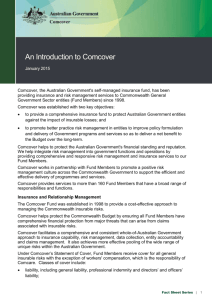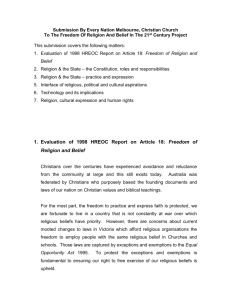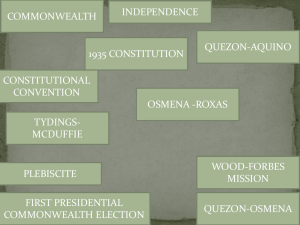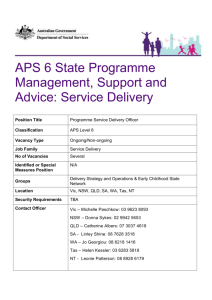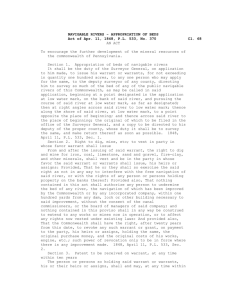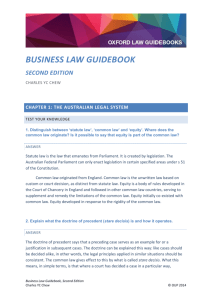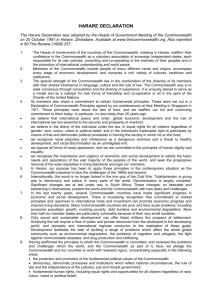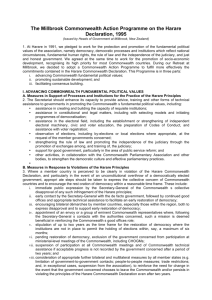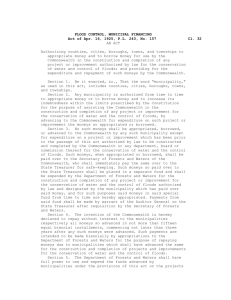Government as Guardian and Trustee of the Commonwealth
advertisement
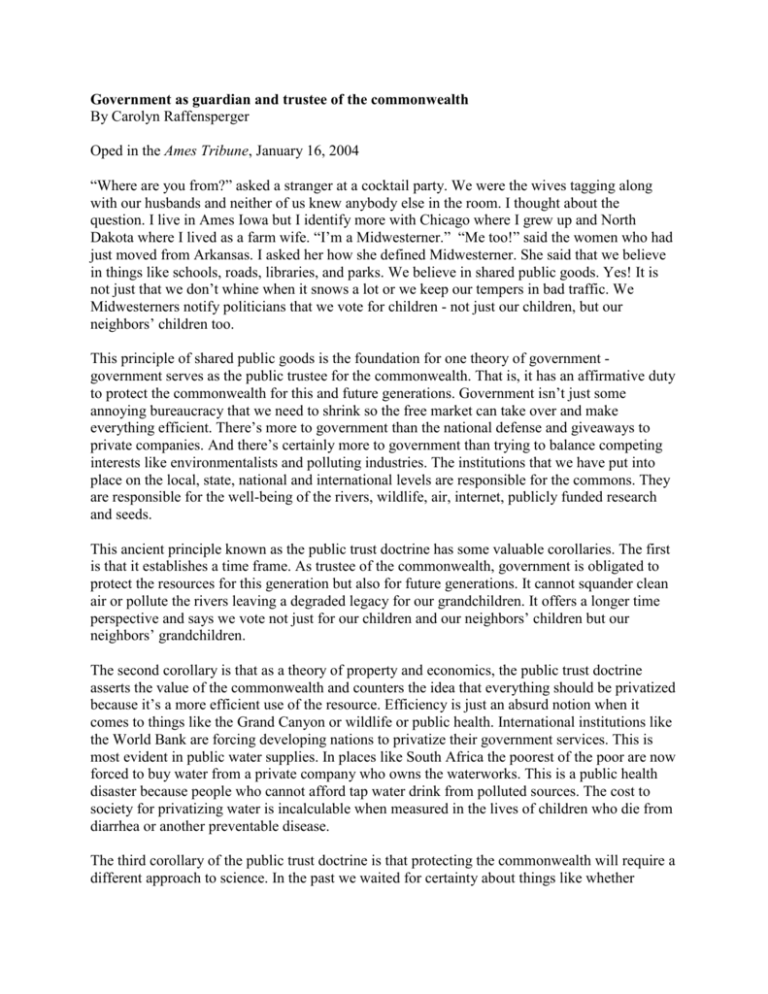
Government as guardian and trustee of the commonwealth By Carolyn Raffensperger Oped in the Ames Tribune, January 16, 2004 “Where are you from?” asked a stranger at a cocktail party. We were the wives tagging along with our husbands and neither of us knew anybody else in the room. I thought about the question. I live in Ames Iowa but I identify more with Chicago where I grew up and North Dakota where I lived as a farm wife. “I’m a Midwesterner.” “Me too!” said the women who had just moved from Arkansas. I asked her how she defined Midwesterner. She said that we believe in things like schools, roads, libraries, and parks. We believe in shared public goods. Yes! It is not just that we don’t whine when it snows a lot or we keep our tempers in bad traffic. We Midwesterners notify politicians that we vote for children - not just our children, but our neighbors’ children too. This principle of shared public goods is the foundation for one theory of government government serves as the public trustee for the commonwealth. That is, it has an affirmative duty to protect the commonwealth for this and future generations. Government isn’t just some annoying bureaucracy that we need to shrink so the free market can take over and make everything efficient. There’s more to government than the national defense and giveaways to private companies. And there’s certainly more to government than trying to balance competing interests like environmentalists and polluting industries. The institutions that we have put into place on the local, state, national and international levels are responsible for the commons. They are responsible for the well-being of the rivers, wildlife, air, internet, publicly funded research and seeds. This ancient principle known as the public trust doctrine has some valuable corollaries. The first is that it establishes a time frame. As trustee of the commonwealth, government is obligated to protect the resources for this generation but also for future generations. It cannot squander clean air or pollute the rivers leaving a degraded legacy for our grandchildren. It offers a longer time perspective and says we vote not just for our children and our neighbors’ children but our neighbors’ grandchildren. The second corollary is that as a theory of property and economics, the public trust doctrine asserts the value of the commonwealth and counters the idea that everything should be privatized because it’s a more efficient use of the resource. Efficiency is just an absurd notion when it comes to things like the Grand Canyon or wildlife or public health. International institutions like the World Bank are forcing developing nations to privatize their government services. This is most evident in public water supplies. In places like South Africa the poorest of the poor are now forced to buy water from a private company who owns the waterworks. This is a public health disaster because people who cannot afford tap water drink from polluted sources. The cost to society for privatizing water is incalculable when measured in the lives of children who die from diarrhea or another preventable disease. The third corollary of the public trust doctrine is that protecting the commonwealth will require a different approach to science. In the past we waited for certainty about things like whether tobacco caused cancer before we took public health action. If government is to protect the commonwealth for future generations, sometimes it will have to act before absolute proof is in the bag. It will have to take precautionary action on the weight of the evidence. A key example is the current mad cow debacle. Government could have taken additional precautionary actions and not waited until BSE devastated the cattle industry and the U.S. food system. It could have required that any downed cow not be rendered or put into the food supply. It could have stopped feeding any animal parts to cows, including the blood meal sometimes added to milk replacer for calves. But it didn’t. Similarly, government may need to act on the weight of the evidence about the public health consequences of things like hydrogen sulfide from factory hog farms, or fish kills in rivers. How much do we need to know before we take precautionary action to protect public health and the commons? One conservative view of government is that government simply has no place since it is an inefficient manager of goods and services. One liberal view is that government has been such a bad actor that it got us into Viet Nam and is only a shill for corporations like Halliburton. It is time for a new dialogue about the value of government. We have an opportunity with the upcoming election to ask all politicians, conservative and liberal alike, what their theory of government is. I believe that the public trust doctrine holds an elegant promise born out of Midwest values that there’s a visionary, heroic role for government as guardian and trustee of the commonwealth. This year I am joining you in voting for my neighbors’ grandchildren.


